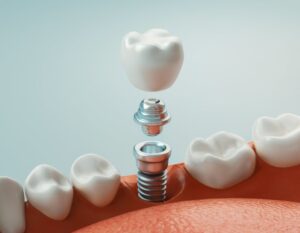
Dental implants are often referred to as the gold standard for tooth replacement, but are they truly stronger than natural teeth? The answer isn’t as simple as “yes” or “no.” While implants are incredibly durable and long-lasting, the comparison depends on what aspect of strength you’re talking about: structural durability, resistance to decay, or long-term performance under pressure.
Let’s take a closer look at how dental implants stack up against natural teeth.
What Are Dental Implants Made Of?
Dental implants are composed of three parts: a titanium (or zirconia) post that fuses with the jawbone, an abutment, and a crown made from ceramic or porcelain. These materials are engineered to withstand high levels of pressure and wear, making implants exceptionally durable.
Titanium, in particular, is biocompatible and incredibly strong, which is why it’s used in many medical devices, including joint replacements. Once the implant fuses with your jawbone through a process called osseointegration, it forms a solid foundation that mimics the root of a natural tooth.
Implants vs. Natural Teeth: Strength Comparison
Resistance to Damage
Dental implants are more resistant to chipping, cracking, and everyday wear than natural enamel. While natural teeth can suffer from decay, fractures, and sensitivity, implant crowns (especially those made from zirconia or high-grade porcelain) don’t decay and are less prone to cracking under normal use.
Bite Force and Functionality
Studies show that dental implants can restore up to 90 percent or more of your original bite strength, especially once healing is complete. This means you can enjoy most of your favorite foods without worrying about the implant’s ability to handle the pressure. In many cases, patients report that implants feel just as stable – if not more so – than their natural teeth did before they were lost.
Durability Over Time
With proper care, implants can last 20 years or more, often a lifetime. Natural teeth, on the other hand, can wear down over time, especially if exposed to decay, gum disease, or injury. However, natural teeth have the advantage of being living tissues, with the ability to respond to infection and regenerate to a certain degree.
What Implants Can’t Do
While implants are durable and decay-resistant, they’re not invincible. Gum disease (called peri-implantitis when it affects implants) can still threaten their stability. And unlike natural teeth, implants lack the nerves that provide sensory feedback, so you won’t feel pain from a cavity or bite that’s too hard. This can make you more prone to putting stress on the implant without realizing it.
Are dental implants stronger than natural teeth? In many ways, yes, implants are more resistant to decay and damage and can withstand years of use. However, nothing fully replicates the complexity and biological function of a healthy, natural tooth. That’s why dentists aim to preserve your natural teeth whenever possible.
About the Author
Dr. Jane C. Puskas is a cum laude graduate of the Harvard School of Dental Medicine and a winner of multiple awards from the Harvard School of Public Health. She opened her own dental practice in 1994 after establishing herself in Atlanta and today is a member of the Pierre Fauchard Academy, American College of Dentists, and the International College of Dentists. If you’re looking to get your look and functionality back by replacing missing teeth with dental implants, Dr. Puskas and our team would be glad to serve you. Schedule your appointment today online or call us at (404) 261-7488.
